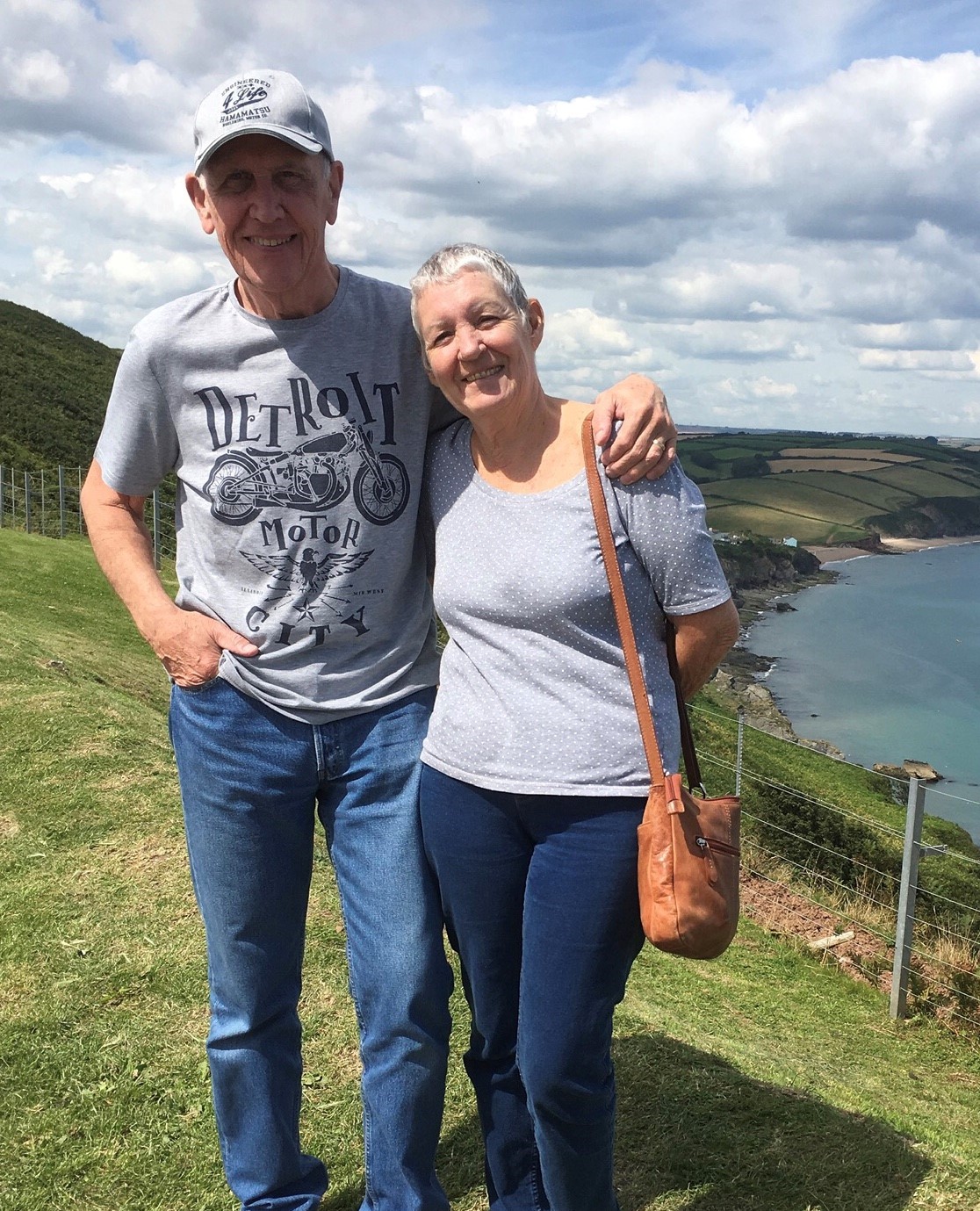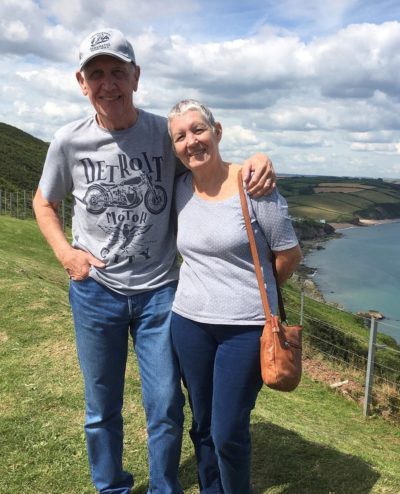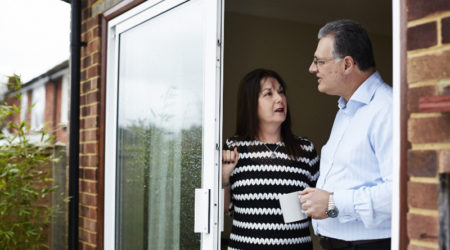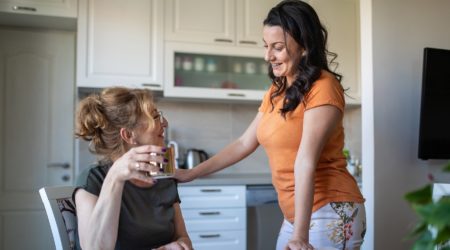



Heather & Stephen
Heather shares her story, after her husband Stephen was diagnosed with terminal pancreatic cancer in 2019.
I would like to tell you about my lovely husband Stephen, who died on 2 August 2020 from pancreatic cancer. Stephen was a fit and healthy 73 year old. He had no symptoms.
Following a hernia operation in 2018 he was investigated for a low platelet count. It was fairly routine, he’d also had a chest scan as he’d developed a cough, again no big deal. I’ll never forget the day in September 2019 when his haematologist told us that she suspected pancreatic cancer. Such a shock and so unexpected. Following a CT scan this was confirmed. To be told that you/your loved one has an inoperable terminal illness and that there is no cure is devastating.
Beginning treatment
Shortly after he was diagnosed he noticed a change in his bowel movements. His stools were pale, smelly and floated. We were told that this was an indication that his food wasn’t being digested properly, a symptom of his cancer. He was prescribed Creon to be taken with meals.
He started chemotherapy in October, gemcitabine and Abraxane® given fortnightly. After his first dose his platelet count dropped to an alarming low 11 and he was given a platelet transfusion. His oncologist decided to reduce the gemcitabine by 25%, and Abraxane® by 50%.
His platelet count remained an issue throughout and was carefully monitored, but he was able to continue chemotherapy without the need for further transfusions. The side effects were manageable and not as bad as we’d imagined. Mainly tiredness for a few days after chemo, and slight hair loss. Regular CT scans showed that the tumour was shrinking, including a small lesion on his liver. We were really hopeful.
Then over Christmas 2019 he was unwell with heartburn/bile reflux and was very jaundiced. He was admitted to hospital on 27th December, had an endoscopy bile duct stent fitted on 3rd January and came home on 17th. I was able to spend every day with him in the hospital, so stressful, but ok.
In March we had the COVID lockdown, really difficult as we couldn’t go out or see friends and family and I couldn’t go with him for his chemotherapy and appointments. Up until then I had attended every appointment and treatment and felt very much part of it all, so we found this very difficult.
Managing symptoms
In 25th May he was really poorly with a very bloated stomach and was again admitted to hospital. This time I had to drop him at the door and wasn’t able to visit him. I can’t describe how that felt. I did go on most days to meet him in the corridor for a few minutes, but it was so difficult for us both not being able to spend time together. Friends used to joke that we were “joined at the hip” as we did everything together.
Following a CT scan and barium swallow which showed a blockage, he was fitted with an NJ (nasojejunal) tube and came home on 3 June. An NJ tube is a tube from the nose to the small intestine. Stephen was unable to take anything by mouth, liquid feed and all medication were through the NJ tube and pump. Stephen was an excellent cook and he derived a great deal of pleasure from food, so this was a particularly difficult time for us both. He loved cooking gorgeous meals and I enjoyed eating them.
He developed really bad stomach pains, bile reflux and his stools were black and he returned to outpatients on 8th June. He was given a liquid antacid. On 9th he returned again and an X-ray showed that the NJ tube had coiled in his stomach so it was removed and refitted on 12th. Over the following few weeks he had severe stomach pains, bile reflux and his stomach was really swollen. He wasn’t able to take the amount of liquid feed that he required and on 28th was again admitted to hospital.
He had a duodenal stent fitted on 3rd July, pain relief on 8th, a nasogastric (Ryles) tube on 14th, an abdominal drain on 17th and on 21st was started on a new chemotherapy treatment FOLFOX. He stayed so positive throughout his horrendous ordeal, these awful procedures that he had to endure.
Coronavirus and lockdown
I continued to visit Stephen in the corridor for a few minutes each day, but sometimes he was too weak to walk out to see me. He didn’t want to ask the staff if I could visit him in the ward as “they only do that for people who are dying”.
It was really difficult having to have these emotional meetings in a corridor with a mask on. He was frightened, in pain, confused and anxious and we were having to make decisions, such as if he should have a different chemo or should we let him spent his final weeks at home.
To protect Stephen I was shielded too so couldn’t meet anyone or go out of house apart from hospital visits. Fortunately, I have a car, otherwise I would not have been able to see him at all. We communicated by WhatsApp messages and later by mobile phone calls as the internet service at the hospital was insufficient for video calls.
To not be with him, when he was so ill was indescribable. If I had been able spend time with him for those last few months it would have made it so much easier for us both.
I had no contact with doctors or nurses until 29th July when I met a Macmillan nurse in the corridor. I was very distressed as Stephen was talking absolute nonsense about “conspiracy theories”, a result of the morphine that he was being given for pain relief. I spoke to her later that evening and she arranged for me to visit him on the ward the next day. I realised that it was the TV that other patients were listening to that was causing his confusion.
He was deteriorating really fast and was moved to a private room that night and I was able to spend his last day and night with him. He was really lucid for a few hours and we talked about our wonderful life together. It was very special and I am so grateful that we were able to do this.
Coping with loss
Pancreatic cancer is the most horrendous illness that I have ever witnessed. To see your strong and healthy loved one struggle through this disease is heart breaking. While I miss Stephen terribly, it is the horror of his illness and suffering that’s keeps me awake at night.
I found that it was very important for me to try to understand what Stephen was going through, particularly as I couldn’t be present at the meetings with his doctors. I researched every procedure and found the information provided by Pancreatic Cancer UK was invaluable. I would encourage everyone to give them their support so that others don’t have to suffer from this most deadly cancer.
It has helped me to write about Stephen and our experience. In retrospect, the one thing that I regret the most is that I didn’t ask anyone for help or support. I felt very isolated, I had no one to explain what was happening and to give me reassurance and support. If I had been able to talk or message someone who understood or had experienced something similar, it would have helped so much.
January 2020




